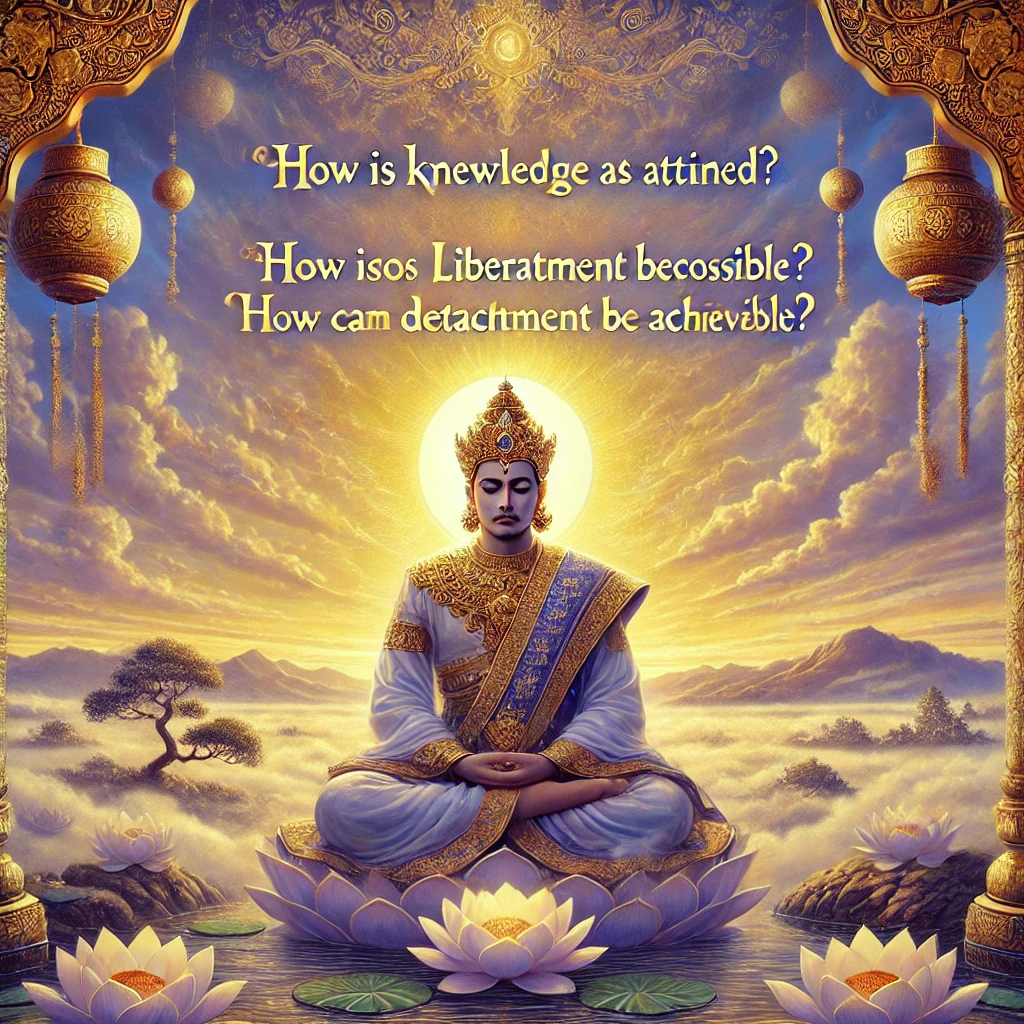अष्टावक्र गीता का पहला श्लोक और उसका गहन अर्थ: In-Depth Explanation of Ashtavakra Gita’s First Shloka

श्लोक (Sanskrit)
"जनक उवाच।
कथं ज्ञानमवाप्नोति कथं मुक्तिर्भविष्यति।
वैराग्यं च कथं प्राप्तं एतद् ब्रूहि मम प्रभो॥"
हिंदी में अर्थ:
राजा जनक, जो एक राजसी जीवन जी रहे हैं और सांसारिक भोग-विलास से परिपूर्ण हैं, यह समझते हैं कि सच्चा आनंद और शांति इन बाहरी सुखों में नहीं है। इस श्लोक में उन्होंने तीन गहरे प्रश्न पूछे हैं:
-
ज्ञान कैसे प्राप्त किया जाए?
राजा यह जानना चाहते हैं कि आत्मज्ञान (Self-Realization) या ब्रह्मज्ञान की प्राप्ति का मार्ग क्या है। यह प्रश्न यह दर्शाता है कि जब व्यक्ति सांसारिक सुखों से परे कुछ और गहरा अनुभव करना चाहता है, तो वह ज्ञान की खोज में प्रवृत्त होता है। -
मुक्ति कैसे संभव है?
यहाँ मुक्ति का अर्थ है बंधनों से छूटना। यह न केवल जन्म और मृत्यु के चक्र से मुक्ति की बात करता है, बल्कि मानसिक और भावनात्मक बंधनों से भी स्वतंत्र होने की बात करता है। राजा जानना चाहते हैं कि कैसे वे इस दासता से बाहर निकल सकते हैं। -
वैराग्य कैसे प्राप्त किया जाए?
वैराग्य का अर्थ है सांसारिक इच्छाओं और आसक्तियों से मुक्त होना। यह मन की उस स्थिति का वर्णन करता है जब व्यक्ति बाहर की दुनिया से अछूता रहकर भी उसके बीच में स्थिरता और शांति पा सकता है।
यह तीनों प्रश्न योग, वेदांत, और दर्शन की मूल जिज्ञासाओं का सार प्रस्तुत करते हैं। यह श्लोक यह संकेत करता है कि सही प्रश्न पूछना आत्मा की यात्रा का पहला कदम है।
इस श्लोक का महत्व
सार्वभौमिक प्रासंगिकता:
ये प्रश्न समय और संस्कृति की सीमाओं से परे हैं। ये हर उस व्यक्ति के साथ जुड़ते हैं जिसने कभी महसूस किया हो कि जीवन का उद्देश्य केवल भौतिक सफलता और सुखों से कहीं अधिक है।
गुरु की भूमिका:
जनक यह स्वीकार करते हैं कि इन गहन प्रश्नों के उत्तर के लिए एक मार्गदर्शक (अष्टावक्र) की आवश्यकता है। यह इस बात पर जोर देता है कि एक शिक्षक का होना कितना महत्वपूर्ण है, जो हमें सही मार्ग दिखा सके।
आध्यात्मिक तैयारी:
यह श्लोक दर्शाता है कि आत्मिक विकास आत्म-जागरूकता और ज्ञान की प्यास से शुरू होता है। जनक के प्रश्न यह दिखाते हैं कि वे सांसारिक जीवन से ऊपर उठने के लिए आंतरिक रूप से तैयार हैं।
आधुनिक जीवन के लिए व्यावहारिक अंतर्दृष्टि
ज्ञान (Gyan):
ऐसा ज्ञान खोजें जो आपको आपके सच्चे स्वभाव को समझने में मदद करे, न कि केवल बाहरी उपलब्धियों तक सीमित हो। यह ध्यान, ग्रंथों का अध्ययन, या आत्म-चिंतन के माध्यम से प्राप्त हो सकता है।
मुक्ति (Mukti):
आज के संदर्भ में मुक्ति का अर्थ है तनाव, चिंता और सामाजिक दबावों से स्वतंत्रता। यह जीवन के उतार-चढ़ाव के बीच आंतरिक शांति पाने के बारे में है।
वैराग्य (Vairagya):
वैराग्य का मतलब दुनिया को त्यागना नहीं है, बल्कि उसमें रहते हुए भी इच्छाओं और भावनाओं की दासता से मुक्त होना है।
Detailed Explanation in English:
King Janaka, despite being a ruler with immense power and wealth, realizes that true peace and fulfillment do not lie in material possessions or worldly pleasures. In this verse, he asks three profound questions:
-
How is knowledge attained?
Janaka seeks the path to self-knowledge or enlightenment. This question highlights the beginning of the spiritual journey when one seeks to know the truth of existence beyond the sensory world. -
How does liberation become possible?
Liberation here refers to freedom from all forms of bondage—physical, mental, emotional, and spiritual. It points to freedom from the cycle of birth and death (moksha) as well as freedom from the ego and worldly attachments. -
How can detachment be achieved?
Detachment (Vairagya) is the ability to remain unaffected by worldly attractions and aversions. Janaka wants to understand how one can rise above desires and attachments while living in the world.
These three questions encapsulate the essence of spiritual inquiry and the quest for self-realization. They are timeless and relevant to anyone who seeks deeper meaning in life.
Significance of This Verse:
-
Universal Relevance:
These questions are not bound by time or culture. They resonate with anyone who has ever felt that life has a higher purpose beyond material success and pleasure. -
The Role of a Guru:
Janaka acknowledges the need for a guide (Ashtavakra) to answer these profound questions. It emphasizes the importance of having a teacher who can illuminate the path. -
Spiritual Readiness:
This verse demonstrates that spiritual growth begins with self-awareness and a thirst for knowledge. Janaka’s questions reflect the inner readiness to transcend worldly life.
Practical Insights for Modern Life:
-
Knowledge (Gyan): Seek knowledge that helps you understand your true self, not just external achievements. This could be through meditation, reading scriptures, or self-reflection.
-
Liberation (Mukti): Liberation in today’s context can mean freedom from stress, anxiety, and societal pressures. It’s about finding inner peace amidst chaos.
-
Detachment (Vairagya): Detachment doesn’t mean renouncing the world but learning to live in it without being enslaved by desires or emotions.
Written by: Gyaan Ganga Team